 MyDogBreeds
MyDogBreeds Finnish Hound is originated from Finland but Australian Stumpy Tail Cattle Dog is originated from Australia. Finnish Hound may grow 11 cm / 5 inches higher than Australian Stumpy Tail Cattle Dog. Both Finnish Hound and Australian Stumpy Tail Cattle Dog are having almost same weight. Finnish Hound may live 3 years less than Australian Stumpy Tail Cattle Dog. Both Finnish Hound and Australian Stumpy Tail Cattle Dog has almost same litter size. Finnish Hound requires Low maintenance. But Australian Stumpy Tail Cattle Dog requires Moderate maintenance
Finnish Hound is originated from Finland but Australian Stumpy Tail Cattle Dog is originated from Australia. Finnish Hound may grow 11 cm / 5 inches higher than Australian Stumpy Tail Cattle Dog. Both Finnish Hound and Australian Stumpy Tail Cattle Dog are having almost same weight. Finnish Hound may live 3 years less than Australian Stumpy Tail Cattle Dog. Both Finnish Hound and Australian Stumpy Tail Cattle Dog has almost same litter size. Finnish Hound requires Low maintenance. But Australian Stumpy Tail Cattle Dog requires Moderate maintenance
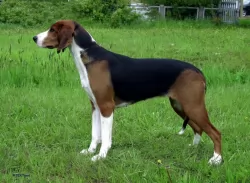 As one of Finland’s most popular dogs, the Finnish Hound isn’t particularly well known outside of Finnish borders. Known also as the Finsk Stovare, the Finnish Hound, known for its hunting skills, came about because of a breeding effort which started way back in the 1800s, mixing dogs such as different French, Swedish, and German hounds.
As one of Finland’s most popular dogs, the Finnish Hound isn’t particularly well known outside of Finnish borders. Known also as the Finsk Stovare, the Finnish Hound, known for its hunting skills, came about because of a breeding effort which started way back in the 1800s, mixing dogs such as different French, Swedish, and German hounds.
These hounds were used with the idea being to develop a dog that could do well in Finland’s terrain. The Finnish Hound is a great hunting dog but isn’t looked upon as an particularly awesome pet, although some pet owners would beg to differ.
 There is quite a bit of mystery surrounding the origin of the Stumpy Tail Cattle Dog. The breed was developed as a working dog to herd sheep and cattle, but there are quite a few theories about the development of the breed. It is agreed however, that the dog was developed in Australia and came about from crossing the Australian Dingo and British herding dogs.
There is quite a bit of mystery surrounding the origin of the Stumpy Tail Cattle Dog. The breed was developed as a working dog to herd sheep and cattle, but there are quite a few theories about the development of the breed. It is agreed however, that the dog was developed in Australia and came about from crossing the Australian Dingo and British herding dogs.
Perhaps the most popular theory for the origin of the Australian Stumpy Tail Cattle Dog is that the breed was developed by a man named Timmins, sheep drover and a cattle operating in New South Wales during the colonial period. Whatever the dog’s origins, it was in 1996 that the United Kennel Club, the 2nd largest dog registry in the world and the United States, granted full recognition to the Stumpy Tail Cattle Dog as a member of the Herding Group. The breed’s name was changed to the Australian Stumpy Tail Cattle Dog in 2002. Today he remains almost exclusively a tail-less working dog.
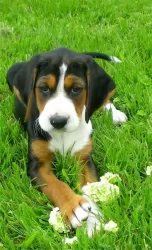 This is a medium sized dog who stands between 52 – 62cm in height and weighs in at 20 to 25kg. The Finnish Hound can have between 4 – 8 puppies.As a scent-hound, the Finnish Hound has a short, smooth double coat which is usually in a tri-color pattern of black, tan, and white.
This is a medium sized dog who stands between 52 – 62cm in height and weighs in at 20 to 25kg. The Finnish Hound can have between 4 – 8 puppies.As a scent-hound, the Finnish Hound has a short, smooth double coat which is usually in a tri-color pattern of black, tan, and white.
The attractive dog has an athletic, lean, muscular body full of energy and stamina. The eyes are brown and the dog has a peaceful expression. The medium length ears are floppy and the tail is long and carried low.
The Finnish Hound is friendly, calm and never aggressive. He is an intelligent dog nd will respond to the training and socialization he will require to turn him into an obedient, amicable pet, especially since he tends to be stubbon, independent and strong-willed. He isn’t recommended for small places in the city but will do better in the country with a fairy large piece of ground. The Finnish Hound is not recommended for apartment life. It is moderately active indoors and does best with at least an average-sized yard.
 An interesting fact about the Australian Stumpy Tail Cattle Dog is that he is naturally tail-less so no tail docking has been required for this naturally bobtailed dog. He is medium-sized to large-sized with his most distinctive feature being the lack of a tail. The coat of the dog is short to medium length, dense and straight. Another interesting aspect is that the coat color is a speckled blue or speckled red.
An interesting fact about the Australian Stumpy Tail Cattle Dog is that he is naturally tail-less so no tail docking has been required for this naturally bobtailed dog. He is medium-sized to large-sized with his most distinctive feature being the lack of a tail. The coat of the dog is short to medium length, dense and straight. Another interesting aspect is that the coat color is a speckled blue or speckled red.
Height of the dog is 46–51 centimetres at the withers the dog is normally squarely proportioned with long legs and pricked ears. The dog has no exaggerated features and what you see is what you get – a plain, hard-working dog which is fit and muscular. He is equally long from chest to rump as he is from the ground to the shoulder.
The muzzle of the dog is of average length, but fairly broad and the nose is always black. The dog is intelligent, alert and also mischievous and he makes a good pet. With proper socialization, he’ll get on well with children they know and who treat them with kindness. He is alert and makes a very good watchdog, being fairly territorial.
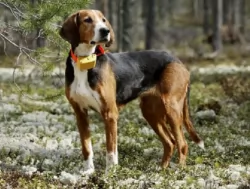 The Finnish Hound has always been a working dog and so he will require being well exercised.
The Finnish Hound has always been a working dog and so he will require being well exercised.
He makes a good pet with homes where there are other dogs as well as children. As a hunting or working dog, these days the Finnish Hound is also regarded as a companion animal, fitting into family life well, and turning out to be a loving, loyal pet.
 The Australian Stumpy Tail Cattle Dog is a hardy dog, capable of hardships that would take its toll on other dog breeds. He is a wonderful athlete and if you’ve got him working with your livestock, he’ll tirelessly perform his duties – small wonder he is so valued in the Australian cattle industry.
The Australian Stumpy Tail Cattle Dog is a hardy dog, capable of hardships that would take its toll on other dog breeds. He is a wonderful athlete and if you’ve got him working with your livestock, he’ll tirelessly perform his duties – small wonder he is so valued in the Australian cattle industry.
If you’re looking for a robust breed who will have all the energy needed to accompany you on all your adventures, he won’t disappoint. He is amazingly capable and always willing.
He’s a family dog and will be loving, devoted and loyal. Care should be taken with him around small children and other pets as he’s not to comfortable around them and he doesn’t tolerate strangers too well either. Train him and socialize him and you’ll have an amazing friend for life.
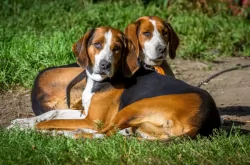 The Finnish Hound is looked upon as a generally healthy breed who can get to 12 years of age if looked after well. Good nutrition plays a huge role towards excellent health.
The Finnish Hound is looked upon as a generally healthy breed who can get to 12 years of age if looked after well. Good nutrition plays a huge role towards excellent health.
Check out common health ailments that can affect most dogs such as dental disease, obesity, hip dysplasia and a serious condition for which these dogs are particularly known – cerebellar ataxia. Lesions in the brain affect the dog’s coordination and sight. Get him to the vet as soon as you detect anything unusual with your pet.
 The Australian Stumpy Tail Cattle Dog is regarded as being an extremely healthy breed, and the average life expectancy of this breed is at least 14 to 15 years and older.
The Australian Stumpy Tail Cattle Dog is regarded as being an extremely healthy breed, and the average life expectancy of this breed is at least 14 to 15 years and older.
They don’t suffer with many genetically inherited conditions, but they are susceptible to
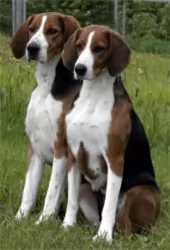 As a medium-sized dog breed, you want to make sure to feed your dog a high-quality commercial dog food – one that has been formulated with the right amount of vitamins and minerals for the type of dog he is.
As a medium-sized dog breed, you want to make sure to feed your dog a high-quality commercial dog food – one that has been formulated with the right amount of vitamins and minerals for the type of dog he is.
He is a high-energy hunting breed, so you wan to find a food that is appropriate to his needs. Home cooked brown rice, vegetables and chicken can be added into his kibble as a change and a treat from time to time as well as some raw meat occasionally. Make sure he always has access to fresh, cool water.
Physically active and mentally balanced and intelligent, the Finnish Hound will require both physical and mental stimulation to prevent him from becoming bored and frustrated.
As an average shedder, your pet's smooth, short-haired coat is easy to keep in tip top condition. All that is really required is to brush the coat down twice a week to keep it in peak condition.
Don’t neglect to check the inside of the dogs ears, as too much dirt and wax can cause nasty ear infections. Also, the teeth need to be brushed at least 2 or 3 times a week with special canine toothpaste and toothbrush. This will ward off tooth decay and lots of other problems within the body brought about by bad teeth.
 The beauty about the Australian Stumpy Tail Cattle Dog is that he is low to moderate maintenance. He will require a good weekly brushing as he can shed quite a bit when the season’s change and his new coat comes in. He is hypoallergenic.
The beauty about the Australian Stumpy Tail Cattle Dog is that he is low to moderate maintenance. He will require a good weekly brushing as he can shed quite a bit when the season’s change and his new coat comes in. He is hypoallergenic.
Australian Stumpy Tail Cattle Dog puppies will need 4 bowls of food over a 24 hour period Puppies from 6 months on can have 2 bowls a day. Speak to your vet about the best foods for your dog and ensure fresh, cool water is constantly available to your pet.
Don’t just feed your dog pellets continuously – mix in some raw meat and some cooked chicken and rice for variety and to ensure a shiny, glossy coat.
The Stumpy is a hugely energetic dog and he will become bored and frustrated if he doesn’t get plenty of exercise and games. Ball throwing, swimming, long walks and a run in the park will be important for the Stumpy that doesn’t live on a farm. Leaving him alone without exercise will lead to anti-social behaviour such as continuous barking, digging and chewing.
Take your Stumpy to the vet if you suspect health problems. Certainly, when you buy a puppy, make sure that he has all his vaccinations. There are certain health problems that are more common in the Australian Cattle dog and you want to do whatever it takes to ensure your dog steers clear of them.